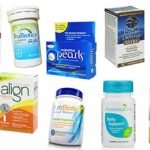5 Common Foods That Cause Bloating
 To put it frankly, bloating is zero fun.
To put it frankly, bloating is zero fun.
As soon as I get bloated, I’m regretting whatever decision I made that got me there (even though sometimes it’s unavoidable).
I also want to get back to my old self as soon as possible.
I’m not alone, since 16% – 30% of people experience bloating on a regular basis.
There are medical conditions that can cause this abdominal discomfort, but food choices are a big culprit when it comes to bloating.
If you’re lucky enough to never experience bloating, it’s when your belly becomes distended, swollen, or enlarged after eating.
Let’s take a look at common foods that cause bloating and what to eat instead.
1. Beans
Beans are a kind of legume that are actually very healthy and provide fiber, protein, minerals, and vitamins.
Unfortunately, beans cause bloating for many people.
They have a type of sugar called alpha-galactosides that is known as a type of carb called FODMAPs.
FODMAPs stands for fermentable oligo-, di-, mono-saccharides and polyols… it’s a real mouthful so let’s stick to FODMAPs.
FODMAPs are carbohydrates that are short-chain, meaning they bypass the digestion process and end up getting fermented by the bacteria in the colon.
The end product is gas and bloating.
FODMAPs usually cause no harm for healthy individuals and end up fueling the food bacteria in the body.
When digestive and stomach ailments come into play such as Irritable Bowel Syndrome (IBS), a different kind of gas is produced which causes extreme discomfort such as gas, stomach cramps, bloating, and diarrhea.
A tip to help remove some of the FODMAPs is to soak the beans, and even change the water multiple times before cooking or eating them.
Alternatives: Black beans and pinto beans are easier for your body to break down, particularly if they’ve been soaked in water. Quinoa, lean meat, or grains can be great alternatives, too.
2. Carbonated Drinks
Bubbly sodas or drinks are also common offenders when it comes to bloating.
These drinks have large levels of carbon dioxide in them, which is a gas.
In turn, when you consume gas, some of it’s bound to get trapped in unwanted places such as the digestive system.
This causes the uncomfortable cramping and pain.
Alternatives: Water will forever be the best bet when it comes to drinks. However, it doesn’t always hit the craving spot so you can also drink tea, coffee, or flavored still water.
3. Apples
Apples are filled with health benefits such as antioxidants, fiber, and vitamin C.
However, ironically enough, apples are known to induce gas and bloating in some individuals.
This is most likely because of the fructose in apples (which is a FODMAP) and the amount of fiber in them.
Fiber and fructose are both susceptible to fermentation within the large intestine and the result is flatulence and swelling of the stomach.
Alternatives: If you cook an apple, it’s easier to digest than eating a raw one. You can also substitute with other types of fruits like grapefruit, bananas, oranges, strawberries, and blueberries.
4. Garlic
Garlic seems harmless enough since it’s used extensively for flavoring dishes and as health remedies.
However, fructans are in garlic (also a kind of FODMAP), which causes gas, burping, and stomach pain.
Alternatives: When you cook garlic, it lessens the potential for bloating. Other things you can try are using other spices such as chives, basil, thyme, and parsley.
5. Rye
Rye is a type of cereal grain that can be related to wheat.
Rye provides any health benefits such as B-vitamins, phosphorus, fiber, copper, and manganese.
The problem is that rye has gluten in it, which is a protein that a number of individuals are allergic or sensitive to.
With gluten and a high fiber amount, rye can be a big no-no for some people and can induce bloating, gas, and constipation.
Alternatives: Some substitutes for rye are brown rice, quinoa, buckwheat, and oats.
In Conclusion…
If you’re experiencing bloating and gas, try removing these common 5 foods: apples, rye, carbonated drinks, garlic, and beans.
You can use the alternatives to these foods and also use a probiotic, which may greatly reduce your symptoms.
To find a perfect probiotic to ease your belly troubles, check out our top 10 best probiotic supplements and get to feeling better in no time!








